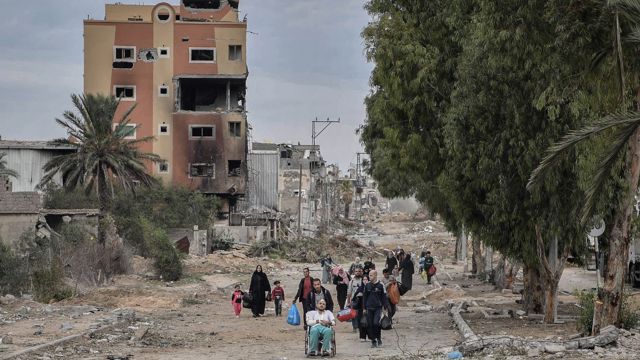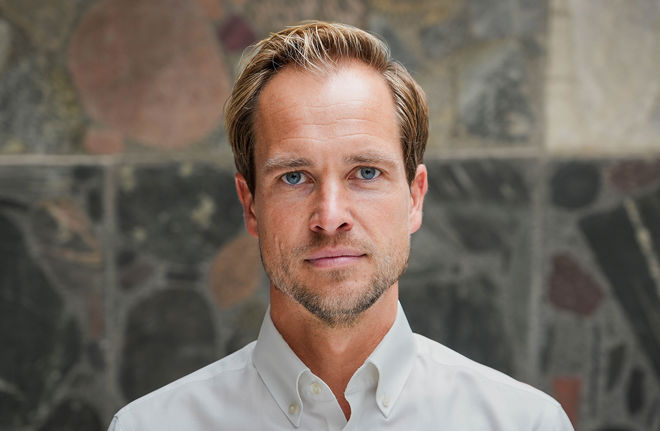Administration of Norwegian aid centralised in Norad

Displaced people from Gaza City heading south on the Gaza Strip during the temporary ceasefire of November 2023.
Norad will today take over major new administrative tasks from the Ministry of Foreign Affairs. This includes Norad now administering the majority of Norwegian emergency aid and having significantly more responsibility for administering Norway’s human rights work.
The Norwegian government has decided to give Norad greater responsibility for the administration of Norwegian aid. The Ministry of Foreign Affairs will retain responsibility for policymaking and governance.
– The conflicts, wars and crises around the world are increasing in number and becoming more protracted. The importance of aid is thus growing. The government has taken the wise step of centralising the administration of humanitarian and long-term development assistance at a time when the global situation dictates that they must be viewed in a more integrated context, says Bård Vegar Solhjell, Norad’s Director General.
– Giving Norad responsibility for administering humanitarian assistance as well is intended to ensure more integrated and effective administration and advice for the Ministry, says Solhjell.
Norad is tasked with helping the government achieve its goals of ensuring Norwegian humanitarian assistance saves lives, alleviates need and safeguards the dignity of people in crisis, as well as ensuring that people in need receive the protection they require in line with the humanitarian principles.
– Norway is internationally recognised as a good, flexible and efficient donor, and we will continue to be in the future, says Solhjell.
New Department for Humanitarian Assistance and Comprehensive Response
At the same time as Norad is taking over responsibility for the administration of emergency aid, a new Department for Humanitarian Assistance and Comprehensive Response is also being created. The department will administer up to NOK 8 billion and more than 150 contracts. The newly created department will be headed by Erik Abild.

Erik Abild leads the new Department for Humanitarian Assistance and Comprehensive Response.
– Our main task will be to help make the biggest possible difference for people in need. Our work is all about people: people in Gaza, Sudan and Afghanistan. We will provide rapid, flexible and predictable funding when crises occur, says Abild, the department’s director.
On 19 August, the UN will mark World Humanitarian Day with a strong call to cease attacks on civilians and aid workers.
– Attacks on aid workers are extremely serious. Tragically, 2023 was a record year for such attacks, and the UN fears that 2024 will be even worse. This is especially due to the war in Gaza, which is decimating all previous records and where more than 200 aid workers have been killed so far. It is primarily local humanitarian aid workers who are being killed. The fact that they are paying with their lives, some of them while trying to help their fellow human beings, is as dramatic as it gets, says Abild.
The new department will also work to ensure that humanitarian needs are seen in the context of long-term development.
– The humanitarian principles provide the framework for Norwegian humanitarian assistance, but we are not just supposed to respond to crises. Norwegian aid should also help prevent crises. We want to ensure that Norwegian support for long-term development, peace efforts and emergency aid is seen in the context of reducing vulnerabilities and strengthening local resilience, says Abild.
The department’s responsibilities will also include lasting solutions for refugees and displaced persons, migration, global security issues and disarmament, large parts of Norway’s support for the UN and initiatives in Europe, Central Asia and Afghanistan.
– Core assistance and multi-year assistance for partners will continue to be priorities, and Norad will work to ensure that more donors are working towards the same goals internationally. Norwegian aid must be knowledge-based and evaluated in relation to goals, with clear requirements for quality and results, says Abild.
The Department for Humanitarian Assistance and Comprehensive Response will consist of two sections: the Section for Humanitarian Assistance led by Stine Horn and the Section for Prevention and Stabilization led by Gunvor W. Skancke. Monica Svenskerud will be the department’s deputy director.
Greater responsibility for human rights
Norad is also taking on significant responsibility for the administration of Norway’s human rights efforts.
– At a time when human rights and democracy are under pressure in many countries, our work must be goal-oriented. In the future, partnerships with national, regional and global stakeholders in this area will be particularly important in contributing to sustainable development through stronger respect for human rights, says Solhjell.
The new Section for Human Rights and Civil Society in the Department of Human Development will have responsibility for this. The section's new leader will be Zenia Chrysostomydis.
Norad has the responsibility to provide technical advice, as well as advice related to grant management procedures, to the Norwegian system for international cooperation. Norad has also been given the responsibility to develop and operate the systems used in the management of aid funds. We will work purposefully to streamline and improve grant management. We will also ensure that the development cooperation is knowledge-based, cost-effective and based on trust in our partners.
